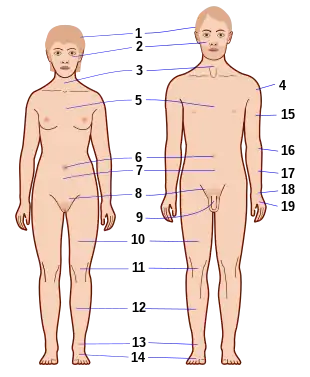تم
Arabic
Etymology 1
From the root ت م م (t-m-m).
Pronunciation
- Verb: IPA(key): /tam.ma/
Verb
تَمَّ • (tamma) I, non-past يَتِمُّ (yatimmu)
- to be fulfilled, to be completed
- (proscribed) to come about, to happen, to take place
- to persist (in) (with عَلَى (ʕalā))
- to continue (something) (with عَلَى (ʕalā))
Usage notes
- Particularly in newspaper and media style, تَمَّ (tamma) is often used with a verbal noun as its subject to express the English passive:
- تَمَّ ٱعْتِقالُ عَدَدٍ مِنَ ٱلْعَناصِرِ ٱلْإرْهابِيَّةِ فِي ٱلْقاهِرَةِ لَيْلَةَ ٱلْأَمْسِ.
- tamma ʕtiqālu ʕadadin mina l-ʕanāṣiri l-ʔirhābiyyati fī l-qāhirati laylata l-ʔamsi.
- A number of terrorist militants were arrested in Cairo last night.
Conjugation
| verbal nouns الْمَصَادِر |
tamm or timm or tumm or tamām or timām or tumām or tamāma or timāma | |||||||||||
|---|---|---|---|---|---|---|---|---|---|---|---|---|
| active participle اِسْم الْفَاعِل |
tāmm | |||||||||||
| passive participle اِسْم الْمَفْعُول |
مَتْمُوم matmūm | |||||||||||
| active voice الْفِعْل الْمَعْلُوم | ||||||||||||
| singular الْمُفْرَد |
dual الْمُثَنَّى |
plural الْجَمْع | ||||||||||
| 1st person الْمُتَكَلِّم |
2nd person الْمُخَاطَب |
3rd person الْغَائِب |
2nd person الْمُخَاطَب |
3rd person الْغَائِب |
1st person الْمُتَكَلِّم |
2nd person الْمُخَاطَب |
3rd person الْغَائِب | |||||
| past (perfect) indicative الْمَاضِي |
m | tamamtu |
tamamta |
تَمَّ tamma |
تَمَمْتُمَا tamamtumā |
تَمَّا tammā |
tamamnā |
tamamtum |
tammū | |||
| f | tamamti |
tammat |
تَمَّتَا tammatā |
tamamtunna |
tamamna | |||||||
| non-past (imperfect) indicative الْمُضَارِع الْمَرْفُوع |
m | ʔatimmu |
tatimmu |
yatimmu |
تَتِمَّانِ tatimmāni |
يَتِمَّانِ yatimmāni |
natimmu |
tatimmūna |
yatimmūna | |||
| f | tatimmīna |
tatimmu |
تَتِمَّانِ tatimmāni |
tatmimna |
yatmimna | |||||||
| subjunctive الْمُضَارِع الْمَنْصُوب |
m | ʔatimma |
tatimma |
yatimma |
تَتِمَّا tatimmā |
يَتِمَّا yatimmā |
natimma |
tatimmū |
yatimmū | |||
| f | tatimmī |
tatimma |
تَتِمَّا tatimmā |
tatmimna |
yatmimna | |||||||
| jussive الْمُضَارِع الْمَجْزُوم |
m | ʔatimma or ʔatimmi or ʔatmim |
tatimma or tatimmi or tatmim |
yatimma or yatimmi or yatmim |
تَتِمَّا tatimmā |
يَتِمَّا yatimmā |
natimma or natimmi or natmim |
tatimmū |
yatimmū | |||
| f | tatimmī |
tatimma or tatimmi or tatmim |
تَتِمَّا tatimmā |
tatmimna |
yatmimna | |||||||
| imperative الْأَمْر |
m | timma or timmi or itmim |
تِمَّا timmā |
timmū |
||||||||
| f | timmī |
itmimna | ||||||||||
| passive voice الْفِعْل الْمَجْهُول | ||||||||||||
| singular الْمُفْرَد |
dual الْمُثَنَّى |
plural الْجَمْع | ||||||||||
| 1st person الْمُتَكَلِّم |
2nd person الْمُخَاطَب |
3rd person الْغَائِب |
2nd person الْمُخَاطَب |
3rd person الْغَائِب |
1st person الْمُتَكَلِّم |
2nd person الْمُخَاطَب |
3rd person الْغَائِب | |||||
| past (perfect) indicative الْمَاضِي |
m | — | — | تُمَّ tumma |
— | — | — | — | — | |||
| f | — | — | — | — | — | |||||||
| non-past (imperfect) indicative الْمُضَارِع الْمَرْفُوع |
m | — | — | yutammu |
— | — | — | — | — | |||
| f | — | — | — | — | — | |||||||
| subjunctive الْمُضَارِع الْمَنْصُوب |
m | — | — | yutamma |
— | — | — | — | — | |||
| f | — | — | — | — | — | |||||||
| jussive الْمُضَارِع الْمَجْزُوم |
m | — | — | yutamma or yutammi or yutmam |
— | — | — | — | — | |||
| f | — | — | — | — | — | |||||||
Noun
تَمّ or تِمّ or تُمّ • (tamm or timm or tumm) m
- verbal noun of تَمَّ (tamma) (form I)
Declension
| Singular | basic singular triptote | ||
|---|---|---|---|
| Indefinite | Definite | Construct | |
| Informal | تَمّ; تِمّ; تُمّ tamm; timm; tumm |
التَّمّ; التِّمّ; التُّمّ at-tamm; at-timm; at-tumm |
تَمّ; تِمّ; تُمّ tamm; timm; tumm |
| Nominative | تَمٌّ; تِمٌّ; تُمٌّ tammun; timmun; tummun |
التَّمُّ; التِّمُّ; التُّمُّ at-tammu; at-timmu; at-tummu |
تَمُّ; تِمُّ; تُمُّ tammu; timmu; tummu |
| Accusative | تَمًّا; تِمًّا; تُمًّا tamman; timman; tumman |
التَّمَّ; التِّمَّ; التُّمَّ at-tamma; at-timma; at-tumma |
تَمَّ; تِمَّ; تُمَّ tamma; timma; tumma |
| Genitive | تَمٍّ; تِمٍّ; تُمٍّ tammin; timmin; tummin |
التَّمِّ; التِّمِّ; التُّمِّ at-tammi; at-timmi; at-tummi |
تَمِّ; تِمِّ; تُمِّ tammi; timmi; tummi |
Etymology 2
(This etymology is missing or incomplete. Please add to it, or discuss it at the Etymology scriptorium.)
Declension
| Singular | basic singular triptote | ||
|---|---|---|---|
| Indefinite | Definite | Construct | |
| Informal | تَمّ tamm |
التَّمّ at-tamm |
تَمّ tamm |
| Nominative | تَمٌّ tammun |
التَّمُّ at-tammu |
تَمُّ tammu |
| Accusative | تَمًّا tamman |
التَّمَّ at-tamma |
تَمَّ tamma |
| Genitive | تَمٍّ tammin |
التَّمِّ at-tammi |
تَمِّ tammi |
References
- Kazimirski, Albin de Biberstein (1860), “تم”, in Dictionnaire arabe-français contenant toutes les racines de la langue arabe, leurs dérivés, tant dans l’idiome vulgaire que dans l’idiome littéral, ainsi que les dialectes d’Alger et de Maroc (in French), volume 1, Paris: Maisonneuve et Cie, page 206
- Lane, Edward William (1863), “تم”, in Arabic-English Lexicon, London: Williams & Norgate, pages 315
- Wehr, Hans (1979), “تم”, in J. Milton Cowan, editor, A Dictionary of Modern Written Arabic, 4th edition, Ithaca, NY: Spoken Language Services, →ISBN, page 117
- Steingass, Francis Joseph (1884), “تم”, in The Student's Arabic–English Dictionary, London: W.H. Allen, page 187
Moroccan Arabic
Pronunciation
- IPA(key): /temː/, /tem.ma/
Audio (file)
Persian
Etymology 1
Middle Persian [script needed] (tom, tam, “dark”), from Proto-Iranian *támHah, from Proto-Indo-Iranian *támHas, from Proto-Indo-European *témHos (“darkness”), from *temH- (“dark”).
Noun
تم • (tam)
South Levantine Arabic
| Picture dictionary | ||
|---|---|---|
| ||
|
Urdu
Etymology
Inherited from Sauraseni Apabhramsa तुम्हि (tumhi), from Sauraseni Prakrit 𑀢𑀼𑀫𑁆𑀳𑁂 (tumhe), from Sanskrit युष्मान् (yuṣmān, acc. pl.) adopting the initial sounds of त्वम् (tvám, nom. sg.).
Pronunciation
- (Standard Urdu) IPA(key): /t̪ʊm/
- (Deccani) IPA(key): /t̪ʊm/
Pronoun
تم • (tum) (Hindi spelling तुम)
- (semiformal, familiar) second-person subjective or objective personal pronoun, grammatically plural: you, ye; Early Modern English ye.
- کیا تم مجھ سے محبت کرتی ہو؟
- kyā tum mujh-se mohabbat kartī ho?
- Do you love me?
- تم جیسے لوگوں کی ہی ضرورت ہے یہاں۔
- tum jaise logõ kī hī zarūrat hai yahā̃.
- People like you are needed here.
Usage notes
- تم is the mid level formal way of expressing "you" in Urdu and is used when addressing those of equal social status or those one has a close enough relationship with to justify the reduced formality. Because the less formal forms could offend others, آپ is the safest way to express "you" unless there is reason to be less formal.
- Because تم is grammatically plural (adjectives and verbs etc affected by it take their plural forms) even when there is only one person being referred to, the term تم لوگ (literally: you people) can be used to specify that more than one person is being referred to.
Determiner
تم • (tum) (Hindi spelling तुम)
- The individual or group spoken or written to; you, ye, Early Modern English ye.
- تم احمق کوئی کام کے نہیں ہو۔
- tum ahmaq ko'ī kām ke nahī̃ ho.
- You idiots are of no use.
Declension
See also
- آپ (āp) - formal, polite, grammatically plural
- تو (tū) - informal, intimate, contemptuous or possibly vulgar, grammatically singular
| Urdu personal pronouns | ||||||
|---|---|---|---|---|---|---|
| Person | Description | Direct case | Indirect case | Ergative case | Dative/Accusative case | |
| 1st person | singular | مَیں (ma͠i) | مجھ (mujh) | میں نے (ma͠i-ne) | مجھ کو (mujh-ko),
مجھے (mujhe) | |
| plural | ہم (ham) | ہم نے (ham-ne) | ہم کو (ham-ko),
ہمیں (hamẽ) | |||
| 2nd person | informal (intimate) | تُو (tū) | تجھ (tujh) | تو نے (tū-ne) | تجھ کو (tujh-ko),
تجھے (tujhe) | |
| semiformal (familiar) | تم (tum) | تم نے (tum-ne) | تم کو (tum-ko),
تمہیں (tumhẽ) | |||
| formal (polite) | آپ (āp) | آپ نے (āp-ne) | آپ کو (āp-ko) | |||
| 3rd person | proximal | singular / informal | یہ (ye) | اِس (is) | اِس نے (is-ne) | اِس کو (is-ko),
اِسے (ise) |
| plural / formal | اِن (in) | اِنہوں نے (inhõ-ne) | اِن کو (in-ko),
اِنہیں (inhẽ) | |||
| distal | singular / informal | وہ (vo) | اُس (us) | اُس نے (us-ne) | اُس کو (us-ko),
اُسے (use) | |
| plural / formal | اُن (un) | اُنہوں نے (unhõ-ne) | اُن کو (un-ko),
اُنہیں (unhẽ) | |||

